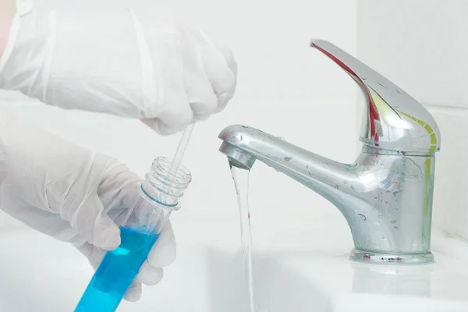Arsenic in the Water Supply: What Does it Do to Humans, Pets and Plants?

Arsenic in the Water Supply: What Does it Do to Humans, Pets and Plants?
Knowing about arsenic in water can help you understand what it can do to humans, as well as animals and plants. Routine water testing can confirm the safety of your water supply or reveal a variety of contaminants, including arsenic. This brief overview is intended to explain what arsenic is, how exposure to it may occur, its potential dangers and the protective measures and treatments to safeguard you and your loved ones. For any questions, contact your local water filtration experts, such as the Aqua Pump Company, to answer any questions, inspect your water and help secure your water supply by removing arsenic or mitigating the possibility of future exposure.
What is arsenic?
Arsenic is a chemical element. What arsenic does to humans it also does to other organisms when this compound is inhaled, consumed or absorbed through the skin. Even lower levels of exposure over long periods of time pose health dangers. Arsenic can also compromise the survival of plants, animals and other microorganisms by direct exposure through soil or water or accumulation in the tissues of living organisms that are then consumed by other beings.
How does arsenic contaminate a water supply?
Human and pet family members, as well as any edible or decorative plants on a property, are most frequently exposed to arsenic through the water supply. While the presence of iron might discolor water or high levels of hydrogen sulfide may cause a displeasing odor, arsenic in water is virtually undetectable outside of professional chemical testing. Since it is naturally present in the Earth’s crust, it can easily make its way into nearby water sources, though the amount of arsenic present can vary by location. Additionally, some pesticides and fertilizers contain arsenic, which can leach into water sources directly or into the soil which then transfers into the water supply. Areas where there is a substantial amount of mining, smelting or certain types of manufacturing may also cause an increase in the presence of arsenic. Finally, arsenic exposure may also occur when wells are poorly constructed or maintained, which enables contaminated surface water into the home’s water supply. It is important to work with a local water filtration company to address any well repair issues in a timely manner. Consequently, all water-sourcing locations benefit from routine water evaluations, but water testing is particularly important for homes with wells (and it is incredibly important to use a well location service if you are unsure where your well is located on your property).
What dangers does arsenic pose to humans, pets and plants?
Routine water testing is essential for protecting your family and other living organisms on your property, because its detection requires chemical analysis. Here are some of the dangers and complications that arsenic exposure can cause:
What does arsenic do to humans?
Intense exposure to high levels of arsenic can cause symptoms like nausea, abdominal pain or even death upon ingestion or inhalation. As it is a carcinogen, prolonged exposure to even low levels of arsenic in the water supply, surrounding air or food sources causes cancers, such as lung cancer, skin cancer and kidney cancer. Similarly, this low but lengthy exposure can impact reproductive health and even unborn children during pregnancy. Skin lesions and discoloration, hypertension and heart disease, and the compromising of many of the body’s essential systems (cardiovascular, immune, respiratory, etc.) are yet still more of the potential dangers of chronic arsenic exposure.
What does arsenic do to pets or other animals?
Like humans, pets exposed to water, soil or plants that have been contaminated with arsenic can lead to the spectrum of suffering from vomiting to death. It’s important to note that pets are also likely to be exposed to arsenic, especially as found in pesticides or fertilizer, that they absorb through their paws and fur.
What does arsenic do to plants?
Although arsenic-based pesticides are not as common today, their presence may still linger in the soil and compromise water sources in the area. So, even if a home gardener is not using products identified as having arsenic, their carrots, flowers and other vegetation may be impacted. However, some fertilizers continue to include arsenic which can negatively impact plant growth and overall crop productivity. Also, consuming plants grown in contaminated areas may be one way that chronic arsenic exposure happens which can cause the health risk listed above. As with water testing, soil testing may also help reveal the presence of arsenic and may provide helpful information about a potential source of this contaminant.
How can you protect your water supply?
In addition to routine water testing and regular well pump repair and maintenance, the Aqua Pump Company can provide further treatment recommendations based on the specific water chemistry and installation conditions of your property. Here are two of our powerful offerings that are specifically focused on protecting against arsenic exposure and the risks that it poses to all.
- Reverse osmosis units: Through the process of reverse osmosis, approximately 95-98% of contaminants including arsenic, sediment, fluoride, chlorine and others, can be removed from the water supply. As such, a home’s water safety and quality can be optimized.
- Arsenic water filtration systems: These whole house filtration systems reduce the presence of arsenic in the water to less than 0.010 mg/L (ppm). Subsequent water tests can help show how effectively the arsenic is being removed and ensure effective functioning.
At Aqua Pump Company, we cannot emphasize enough the subtlety and hazardous nature of a contaminant like arsenic. We offer 24 hour emergency service on 365 days a year, because we know how important the safety of and access to your water supply is. For water testing, water filtration systems, well repairs and more, contact the Aqua Pump team today.


